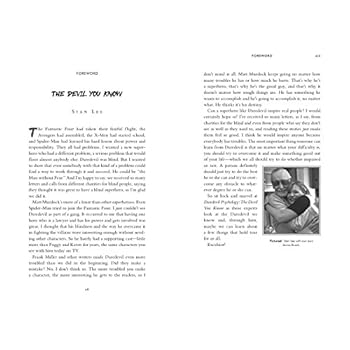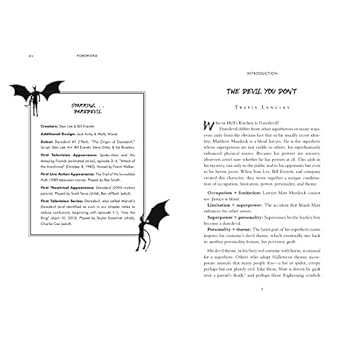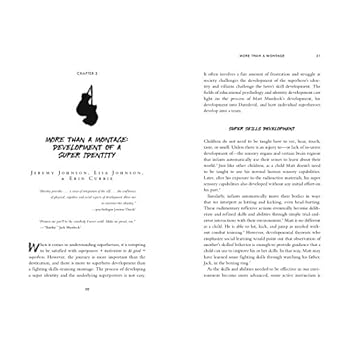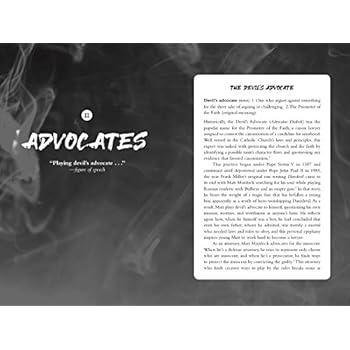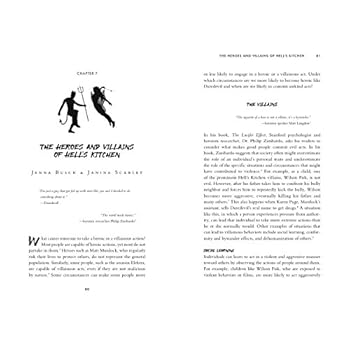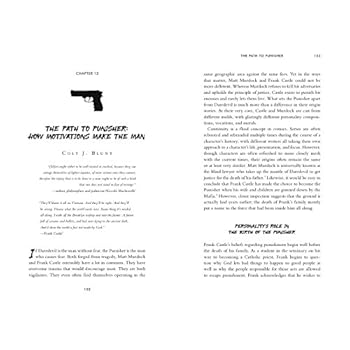Daredevil Psychology: The Devil You Know (Popular Culture Psychology)
Category: Books,Humor & Entertainment,Movies
Daredevil Psychology: The Devil You Know (Popular Culture Psychology) Details
From the Author "Sit back and marvel at Daredevil Psychology: The Devil You Know as these experts look at the Daredevil we know and, though him, maybe we can learn a few things that hold true for us all. Excelsior!" - Stan Lee, from his foreword. Read more From the Inside Flap What kind of person actively enters dangerous situations and engages in risky behavior? When are we more likely to become heroic and when are we likely to commit unkind acts? How does vision interfere with comprehension of sounds, smells, and other sensory cues? Who suffers mental illness after great losses--whether losing loved ones or losing abilities such as sight--and who grows stronger? Who becomes a daredevil? This in-depth exploration, edited by Travis Langley, offers 18 chapters analyzing the psychology behind the complicated superhero Daredevil. Explore these intriguing themes and more in Daredevil Psychology: The Devil You Know. Read more About the Author "This man's a genius!" - Stan Lee.Travis Langley, PhD, is a psychology professor at Henderson State University, the author of Batman and Psychology (Wiley), and the editor of The Walking Dead Psychology, Star Wars Psychology, Game of Thrones Psychology, Wonder Woman Psychology, Captain America vs. Iron Man, and the rest of the Popular Culture Psychology series published by Sterling. He speaks regularly on media and heroism at universities, conferences, and popular-culture conventions including San Diego Comic-Con, New York Comic Con, and others throughout the world. Necessary Evil: Super-Villains of DC Comics and other films have featured him as an expert interviewee, and the documentary Legends of the Knight spotlighted how he uses fiction to teach real psychology. Psychology Today carries his blog "Beyond Heroes and Villains," and he is one of the 10 most popular psychologists on Twitter with over 100,000 followers: @Superherologist. Read more

Reviews
Dr. Travis Langley who wrote the well renown book of his Pop Culture Psychology series, “ Batman and Psychology: A Dark and Stormy Knight” has released his 9 book from the series, “Daredevil Psychology: The Devil You Know”. “Daredevil Psychology” is comprised of writings from psychologists and other specialists of behavioral/cognitive health (including Dr. Langley himself) and they incorporate their knowledge to better understand the world of the Devil of Hell’s Kitchen. One of the co-writers who you might recognize in the book is Dr. Janina Scarlet of Superhero Therapy. The book use various sources of Daredevil---film, like the one featuring Ben Affleck, comics and the recent TV series on Netflix—to have a better view of the “patient”.The book is divided into 5 sections or topics that each go into subtopics or chapters that explain what makes Daredevil tick through his physical and mental abilities as well as interpersonal relationships. For example the “Details” section has three chapters based on sensory skills. What makes this book a little bit more interesting than the “Batman Psychology”, is that we get to see how Daredevil/Matt Murdock how he “sees” through his souped-up senses that affect his psyche.“When [Matt] is struck with a second dose of radiation in adulthood, his senses are further amplified to dysfunctional extremes. […] Matt contracts, in essence, a rare but real condition called hyperacusis, which is an abnormally strong reaction in auditory pathways when someone is exposed to moderate-level sound. His symptoms become so severe that he sequesters himself in a sensory deprivation chamber. He pleads to Stick, the man who long ago taught him to master his abilities, to let him stay in the chamber indefinitely to escape the pain brought by his senses gone amok.” Pgs 116-117Another beautiful thing the book does is that it explains the mental techniques used in Daredevil and show how it would look like in the real world. Continuing from page 117, the book goes on explaining how Matt over comes this hyperacusis:“Stick is known for his tough-love approach to mentoring. Accordingly, he taunts Matt and orders him to leave the tank. Interestingly, Stick is following a real-life protocol for treating hyperacusis. Those with the condition actually need rich sound environments. They need to abandon any ear protection (muffs, plugs, etc.) because it causes an increase in the sensitivity of the auditory system as a result of decreased input.” Pg 117The book also explains how relationships, both past and present, have (like anyone else) shaped his character as both the lawyer and the daredeviled vigilante:“Jack is inconsistent in the ways he relates to his son, sometimes forcing him to play the role of partner, at other times a confidant or friend, and at others, a child or son. Particularly in the parent/child dynamic, diffuse boundaries can have damaging consequences. As an adult, Matt struggles with his history of diffuse boundaries and conflicting roles, unintentionally re-creating them in his new relationships with family members of choice. This is perhaps most evident in his relationship with Foggy Nelson, whom he treats as best friend, partner, kid brother, and taskmaster. Eventually Foggy finds these chaotic roles unsustainable and therefore leaves Matt, sometimes as law partner and sometimes as a friend.” Pgs 66-68Lastly, “Daredevil Psychology” is also an interactive book, which uses examples to better understand the Red vigilante. For instance, through the use of a genogram, to show a graphic example of how Matt and his relationships affect one other through its role, rules and boundaries. This helped to better explain the discussion in chapter 6 titled, “Nelson & Murdock: It’s All In The Family.”“Daredevil Psychology” is a wonderful book that treats its readers like its esteemed colleagues. Informative and insightful as well as well as entertaining it brings light into the dark world of Daredevil. It is not a book to be missed!


